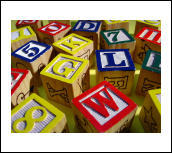FEMA's top dog was canned Thursday night, oh sure he is still Director of something or another but he will no longer have any responsibility for Katrina recovery efforts, and about time as he failed to manage (the "M" in FEMA does stand for Management). Ironically he was not canned for being a pompus failure but for padding his resume.
Either way someone finally did the right thing.
Saturday, September 10, 2005
Friday, September 09, 2005
Katrina's Children Day 11
 Through it all, I see the photos of the children and have asked myself how to help make things easier for them and I think that a Katrina Toy Drive would be nice.
Through it all, I see the photos of the children and have asked myself how to help make things easier for them and I think that a Katrina Toy Drive would be nice.How hard can it be ? Simple: Collect new or in-good-condition toys, unwrapped, sort by age group, ship and distribute.
Ah, but the problems have just begun, I have contacted several organizations for ideas or suggestions and wouldn't you guess it, unless its cash (of course they keep a portion) they are not interested - this was so disappointing ! Even one very commendable nationwide organization has indicated they can't help as it could take away from a "later-in-the-year" event.
Thursday, September 08, 2005
Regarding tennis
 The US Open is in full swing and so I thought a note (from internet sources) about how it came to be might be useful.
The US Open is in full swing and so I thought a note (from internet sources) about how it came to be might be useful.Court tennis an ancestor of most of today's racket games, originated in 14th century France. The word 'tennis" comes from the French "tenez" which means "Get ready, I'm going to serve" and the first serve is said to have been delivered by a servant. "Rackett" comes from the Arabic word "rahat" which means "the palm of the hand." The early name for the game played in France was "Jeu de paum."
A Bristish Major tired to patent the game in England and was told that while he might have taken it to Great Britain, tennis was already played all around the world. (Sounds familiar ?). To make things more interesting, tennis did not come to USA until March 20, 1874 and it was Mary Outerbridge who brought it back to New York, from Bermuda. Tennis was considered 'unladylike" so Mary played with her brothers, their men friends thought it was a "girlie" game until they saw how much skill was needed. (So why are men paid more than women?)
Although tennis historians aren't sure exactly how the term "love" came to mean zero in tennis, the most plausible assumption seems to be that it's based on the French word "l'oeuf." Pronounced correctly "l'oeuf" sounds similar to "love." And the egg or l'oeuf, unquestionably looks like a zero, and could have been used to describe a zero written on a scoreboard. Some romantics say it comes from the idea of playing for love, rather than money--the implication being that one who scores zero consistently can only be motivated by a true love for the game; (pero si l'oeuf es huevo en frances, el amor vale .........?). I like the first explanation better.
And regarding tennis scoring, very complicated and requiring advanced math education, some tennis historian claims that tennis scoring has its origin in medieval numerology. The number 60 was considered to be a "good" or "complete" number back then, in about the same way you'd consider 100 to be a nice round figure today. The medieval version of tennis, therefore, was based on 60--the four points when 15, 30, 45 (which was abbreviated to 40 or someone didnot know advanced math) and 60, or "game".
Sunday, September 04, 2005
and the price of gasoline is....
 From the New York Times 9/04/05:
From the New York Times 9/04/05:"The effect of the damage to oil rigs and refineries in the gulf is the greatest uncertainty. But contrary to early fears, the nation's transportation network has not become overwhelmed so far, and despite spot shortages drivers have generally been able to buy gasoline. The price of crude oil fell 2 percent on Friday - to $67.57, up only $1 from a week ago - as a large importing terminal off the coast of Louisiana reopened and the International Energy Agency announced that it would release emergency oil supplies."
Why then has the price of gasoline at the pump risen over 20% this week? Today I saw BP posted for regular 87 unleaded at $3.32 per gallon, Gulf $3.49, Citgo $2.99, Getty $2.97, Exxon $3.99!
Interestingly prices appear to have gone up before inventories were replaced, so what gives? Will we see third quarter corporate profits rise ?
Subscribe to:
Comments (Atom)